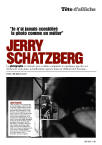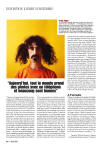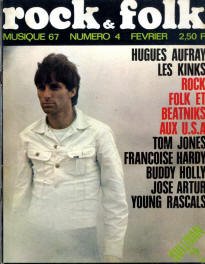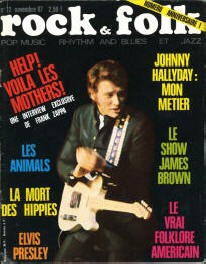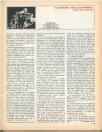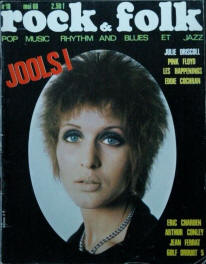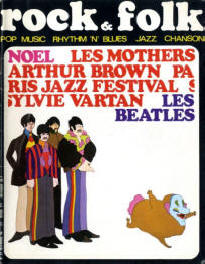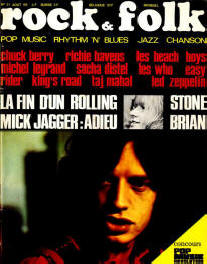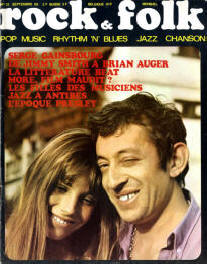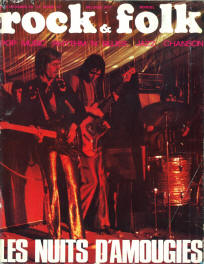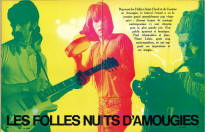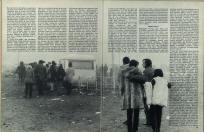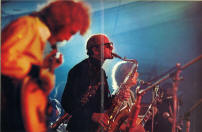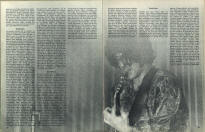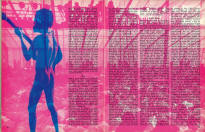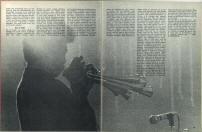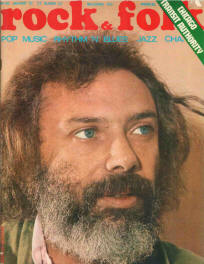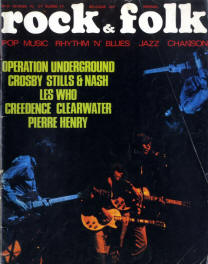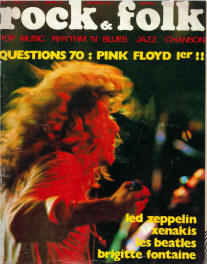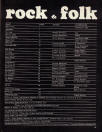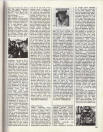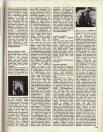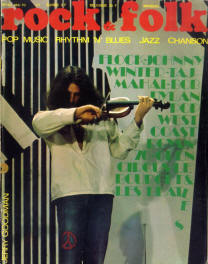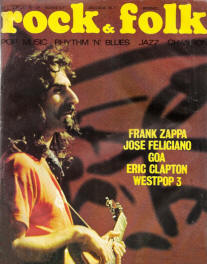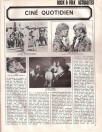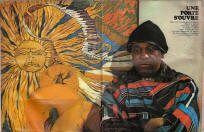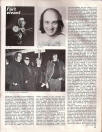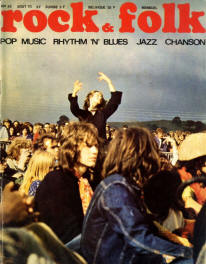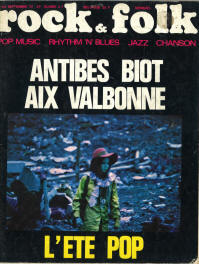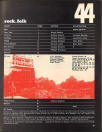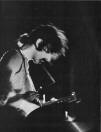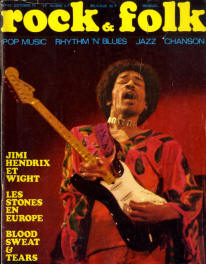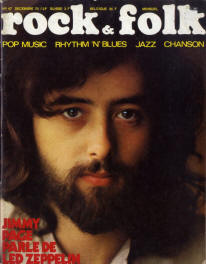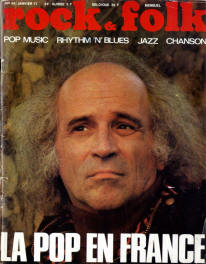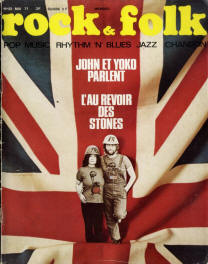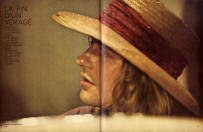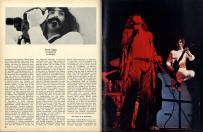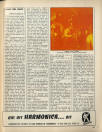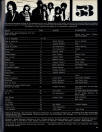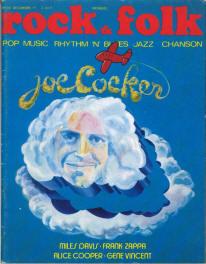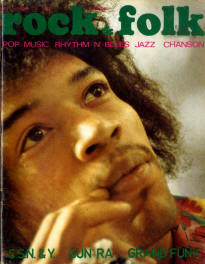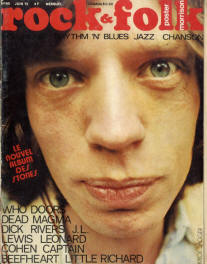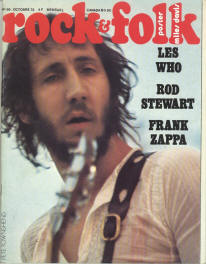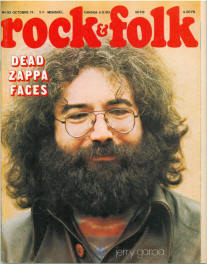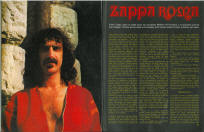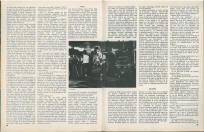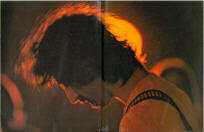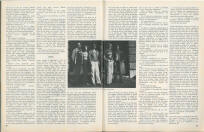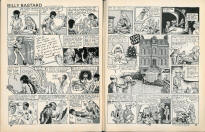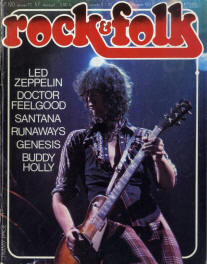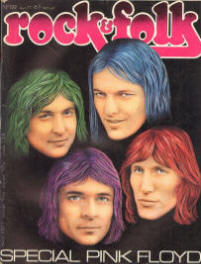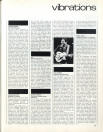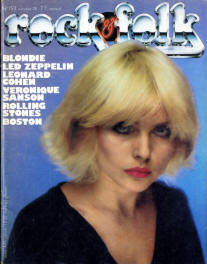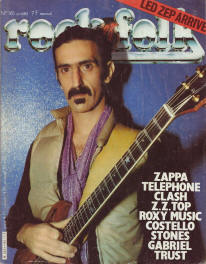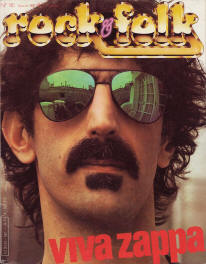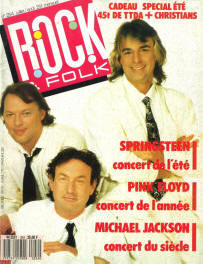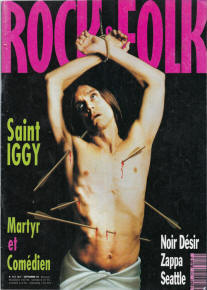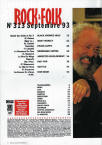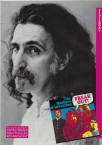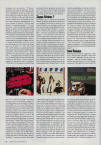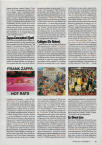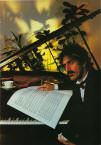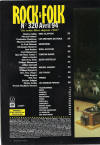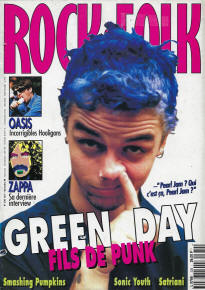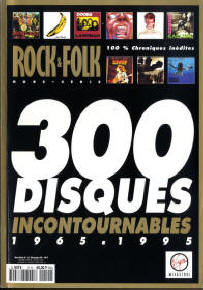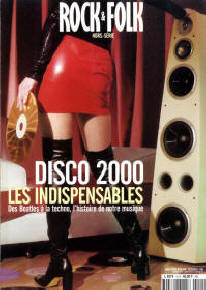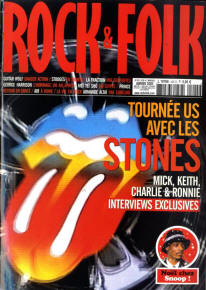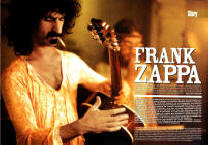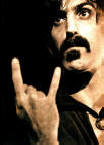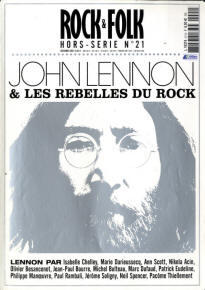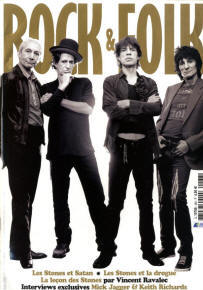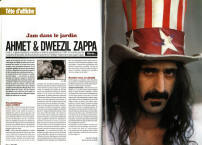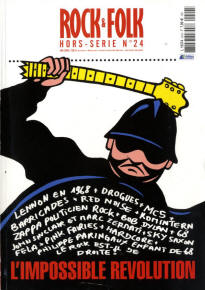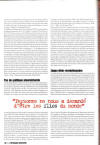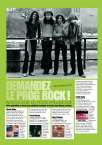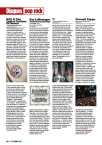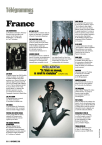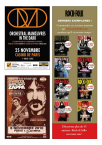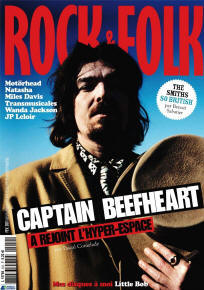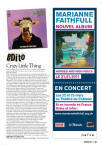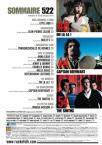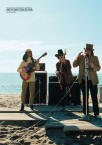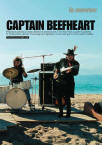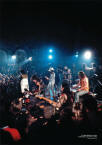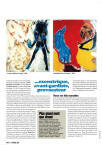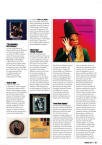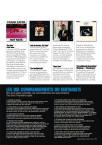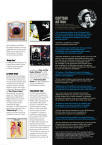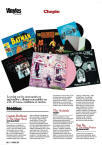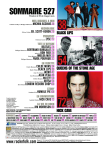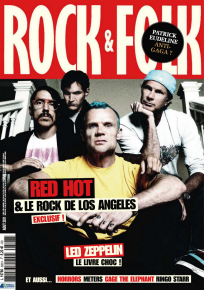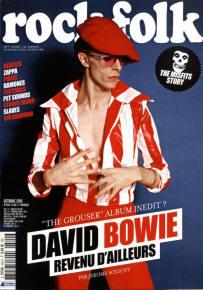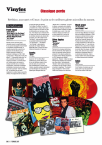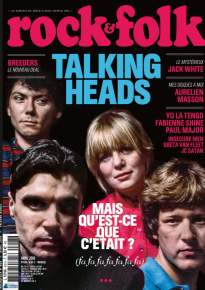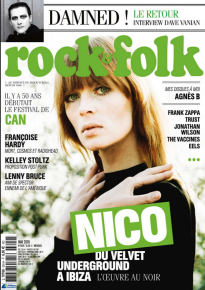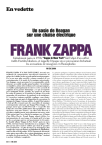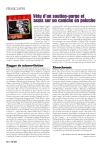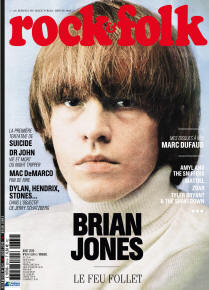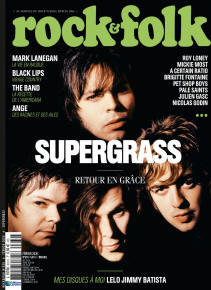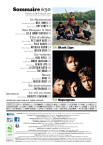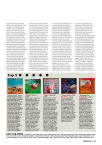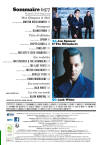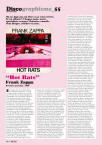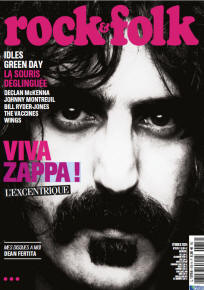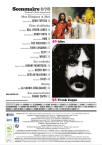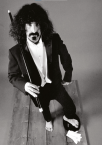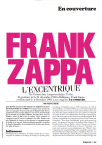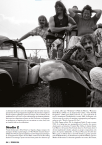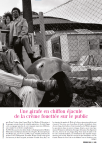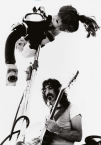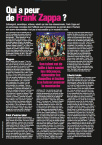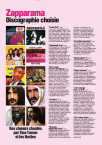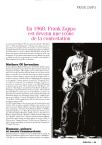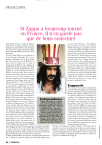Rock & Folk
Automatic translation:
... To recover from these emotions, the "Mothers of Invention"
offer me a festival of fun and good humor. These six absolutely
crazy boys are revolutionizing the musical world in California.
For them, rock is a total spectacle which demands the full support
of the spectator. It gives the most beautiful "happenings" of
the west coast, in the most delirious atmosphere imaginable.
Alongside their performances, Palladium's craziest night looks
like a patronage exhibition on a prize-giving day.
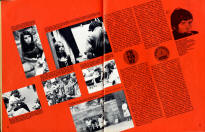
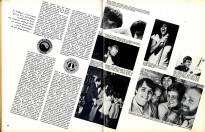
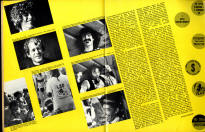
Source: Fulvio Fiore
1967 October
No. 11
Les hippies
By Alain Dister, pp 21-28, 53
Em ...
les adultes (Em ... adults)
By Philippe Rault, p 24
Si ton ame est inculte ... (If your soul is
uneducated)
By Philippe Constantin, p 28
Automatic translation:
Who are these hippies that we talk about so much? Their manners,
their ideas and their music can only fascinate Rock & Folk
readers. It is therefore a real dossier that we present to you.
You can read, in the following pages, Alain Dister's first report,
an objective and in-depth description of the phenomenon. In
addition, you will find the opinion of Philippe Rault, who is
returning from the United States, and a position taken against
it by Philippe Constantin who takes place on a purely philosophical
level. We wanted to approach the subject from all these aspects.
It's up to everyone to make up their own mind.
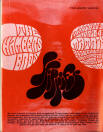
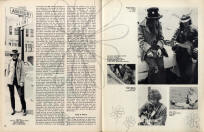
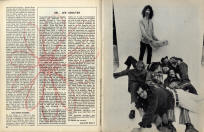
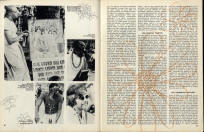
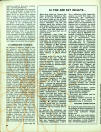
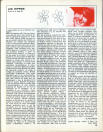
Source: Fulvio Fiore
The first half of an early and important interview
by Philippe Rault. 2nd part was published in the December issue.
(read more)
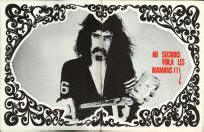
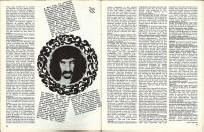
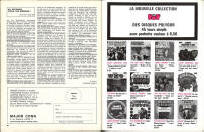
Source: slime.oofytv.set
Automatic translation:
Yes of course. Obviously. Yes. So we were saying ... uh, the
Mothers. Yes. Must do it! Do you understand English? Good? Because
otherwise, no need to insist! (read
more)

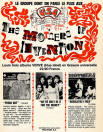
Source: Fulvio Fiore
![]() MOTHERS OF INVENTION FREAK OUT, Hungry
freaks, daddy. I ain't got no heart. Who are the brain police?
Motherly love. Woowie Zowie. You didn't try to call me. I'm
not satisfied. You're probably wondering why I'm here. Trouble
comin' everyday. Help I'm a rock. The return of the son of monster
magnet.
MOTHERS OF INVENTION FREAK OUT, Hungry
freaks, daddy. I ain't got no heart. Who are the brain police?
Motherly love. Woowie Zowie. You didn't try to call me. I'm
not satisfied. You're probably wondering why I'm here. Trouble
comin' everyday. Help I'm a rock. The return of the son of monster
magnet.
VERVE 710.003 (30 cm 26,90 F)
Automatic translation: I will confirm what Kurt Mohr said last
month: "To really fully appreciate Mothers, you must undoubtedly
understand English perfectly, sorry, American because although
I understand English, I have immense difficulties. to "decipher"
what people say about Frank Zappa ". This album is composed
of nine songs, a suite in three movements (Help I'm a rock)
and an unfinished ballet in two tables (The return of the son
of monster magnet). "Motherly love", "Hungry Freaks out, daddy"
and "You didn't try to call me" are the passages that move me
the most.
Source: Fulvio Fiore
1968 August / September
No. 20
Le soleil se couche a l'ouest
(The sun is setting in the west)
By Philippe Paringaux, pp 40-42
Automatic translation: The drama of the Mothers
The most original, in a country where originality and even extravagance
are commonplace, undoubtedly the Mothers of Invention. The picturesque
Frank Zappa and his troupe tried to take over by amplifying
the protest of the folk-singers (Dylan, Baez, Seegers, Guthrie),
and turned it into a provocation, just as the Fugs had done
before them in East. The Mothers have elevated the violence
of words and music to the level of an institution, permanent
provocation, insult to the world. However, their message only
reached a small minority already convinced, which singularly
attenuates its force of impact. The others, the first astonishment
passed, stopped their ears because the music of the Mothers
was not the ideal vehicle for their thought. The tragedy of
Zappa and his men is that their music is extremely limited from
a technical point of view and does not have any solid foundation.
And if the Mothers' verbal invention is prodigious, it can only
concern a small group, language first of all being an obstacle,
which is not serious in itself, but also the music, which is.
much more. If Joan Baez or Bob Dylan managed to make their protest
heard around the world, it is because this protest was conveyed
by quality music which, in the long run, forced the listener
to wonder what the one could well say about such beautiful harmonies.
But the Mothers' music produces the opposite effect, it hurts
the ear (on purpose perhaps, but we would like to have proof
of it on the contrary), irritates and tires in a relatively
short time by its lack of construction and, in short, his poverty.
No doubt you have to see the Mothers on stage to understand,
but then their voice is in the theater and no longer in the
song. Because song rhymes with music.
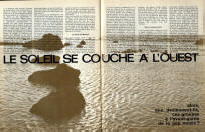

Source: Fulvio Fiore
1968 December
No. 23
Zappa
génie?
By Philippe Constantin, pp 38-42
Mothers
à Paris
By Alain Dister, p 6
Automatic translation:
On Frank Zappa and his Mothers of Invention, Philippe Constantin
has a well-defined opinion. The drama of someone who scribbles
about music is that he inevitably finds himself one day in front
of a new phenomenon that he does not understand. The critic
postulates that he cannot be wrong. He naturally draws the following
corollary, that it is therefore the music that is wrong.
Classical music was "wrong" with Wagner, Berlioz or Bartók,
all murdered by the fashionable critics of the time. (read
more)



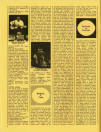
Source: Fulvio Fiore
1969 July
No. 30
Mothers
encore ... ou les caprices du grand Zappa ...
By Philippe Paringaux, pp 37-39
Automatic translation:
An Olympia two-thirds full for the Mothers, it is proof that
the times they are a-changin and that today it has an audience
for groups or artists who would not have made a trip there two
years ago. (read
more)
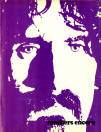
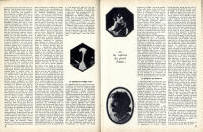
Source: Fulvio Fiore
Automatic translation:
If we didn't talk about this record in Rock & Folk last
month, it's because there was already a long article on the
Mothers there. But a double album from this group and of this
quality, it deserves that we dwell on it a bit. It's the music
for a movie, it seems, a movie the Mothers started and haven't
finished yet for lack of money. (read
more)
![]()
![]()
Source: Fulvio Fiore
1969 December
No. 35
Les folles nuits d'Amougies (The crazy nights
at Amougies)
By Paul Alessandrini, pp 46-57
Automatic translation:
The first Zappa as a soloist. We eagerly awaited what would
come of the man I consider the visionary, who would leave his
indelible mark, whatever happens, on the entire history of pop
music. (read
more)
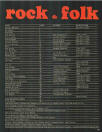
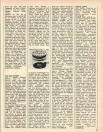
Automatic translation:
"I was tired of playing for people who applaud for all the wrong
reasons!" So spoke Zappa ... On the dull gray plain, in the
thick fog, he was there, vigilant, always ready to play, to
pull and to twist the strings of his guitar ("my guitar wants
to kill you, mamma" ); it was a great pleasure to see Zappa
again, a lonely Zappa, yet buried in the memory of six years
of experience, that of the Mothers of Invention. (read
more)

Source: Fulvio Fiore
Automatic translation:
The sense of adventure with each new work by Zappa is confirmed:
we are at the heart of the avant-garde of all new music. For
those who want to share this adventure, there is no need to
hesitate. Be "visionaries," alongside the visionary. (read
more)
Beside Trout Mask Replica review on
pages 46-49 is an article on the band Flock. Ecerpt from a paragraph
titled "Zappa is a friend":
Automatic translation: “The West Coast is America's anus,” Fred
[Glickstein] tells me bluntly. “But that's where it all started
with the freaks who introduced acid and all that stuff, that
mindset. Their music? Ah, I don't know, that's not what I like.
But Grateful Dead, Jefferson Airplane, it's certainly very worthwhile.
I find Crosby, Stills, Nash and Young a bit commercial. There
is a group that I like, it's Spirit. They make very good music.
There is also Zappa, who is a friend of ours. You know him?
I tell him that the Mothers are quite well known in France and
that French musicians seem to be very marked by people like
the Mothers, Pink Floyd or Soft Machine. I ask him if there
are still a few bands of their style in Chicago. “Like us, I
hope not! But you want to talk about bands that would have a
bit of the same sound? No, really, I don't think so. You know,
it's so hard to eat in Chicago when you're a musician who doesn't
want to play soup or the blues, the same for fifty years...
No, we didn't do like the Chicago musicians, we didn't go on
a West Coast course. We're all from Chicago, we did everything
there. We're almost all jazz musicians, so we almost never had
to do things we didn't like before we started the band. This
is the tragedy of this town: nothing is happening, in fact.
In California, it's prodigious!”
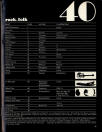
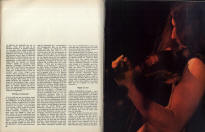
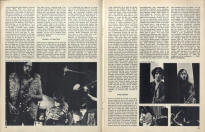
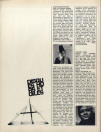
Source: Fulvio Fiore
Tout autre est Frank
Zappa, ou sa musique du moins, car sa façon pincesans-rire de
voir le monde n'est pas très différente de celle de Country
Joe. Zappa présentait ses nouvelles Mothers sous un ciel miraculeusement
lavé, et personne ne fut déçu. La musique de Zappa, aujourd'hui,
peut plus facilement être qualifiée de rock qu'hier. L'homme
a, semble-t-il, décidé de se disperser, de s'adapter aux circonstances,
aux publics devant lesquels il se produit. Grand orchestre ici,
combo là, l'esprit de Zappa souffle toujours mais peut prendre
dix formes différentes sans perdre de sa force. A Bath, Zappa
présenta le groupe qu'il fallait, jouant la musique qu'il fallait,
c'est-à-dire une épure de ce que fut l'art des Mothers d'antan,
moins foisonnante, plus immédiatement accessible, moins ostensiblement
ricanante. Plaire plutôt qu'agresser. Agresser en plaisant.
Difficile équilibre que seul un homme de la trempe de Zappa
peut maintenir. Lui, au moins, on est sOr qu'il ne tombera pas
dans le piège de la facilité. Le groupe tournait merveilleusement
rond, donc, propulsé par le magnifique jeu de batterie d' Aynsley
Dunbar, dessinant à l'unisson les lignes si particulières des
thèmes dus à Zappa, belles et grinçantes, libérant tout à tour
des solistes d'un tel niveau qu'aucun groupe ne peut se prévaloir
d'en posséder autant : Zappa, le fabuleux lan Underwood, seul
survivant des Mothers, qui fit, sur un ténor presque aussi grand
que lui une démonstration à vous couper le souffle, George Duke,
pianiste d'exception que l'on entendit malheureusement trop
peu, et Dunbar, l'enfant du pays. Quelle heure pouvait-il être?
Cinq heures du matin? Six? Quatre? Qui savait encore l'heure?
C'était la fin.
Automatic translation: Frank Zappa is completely different,
or his music at least, because his tongue-in-cheek way of seeing
the world is not much different from Country Joe's. Zappa presented
his new Mothers under a miraculously washed sky, and no one
was disappointed. Zappa's music today can more easily be called
rock than yesterday. The man has, it seems, decided to disperse,
to adapt to the circumstances, to the audiences in which he
performs. Big orchestra here, combo there, Zappa's spirit is
still blowing but can take ten different forms without losing
its strength. In Bath, Zappa presented the right group, playing
the right music, that is to say a sketch of what Mothers' art
was of yesteryear, less abundant, more immediately accessible,
less ostensibly sneering. To please rather than to attack. Aggress
in jest. Difficult balance that only a man of the caliber of
Zappa can maintain. Him, at least, we are sure that he will
not fall into the trap of the easy way. The group turned wonderfully
round, therefore, propelled by the magnificent drums playing
of Aynsley Dunbar, drawing in unison the so particular lines
of the themes due to Zappa, beautiful and squeaky, freeing all
in turn soloists of such a level. that no group can claim to
have so much: Zappa, the fabulous lan Underwood, the only survivor
of the Mothers, who gave, on a tenor almost as tall as him,
a breathtaking demonstration, George Duke, pianist of an exception
that unfortunately too little was heard, and Dunbar, the native
of the country. What time could it be? Five in the morning?
Six? Four? Who still knew the time? It was the end.
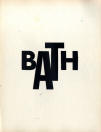


![]()
Source: Fulvio Fiore
Automatic translation:
More than listening to any other record of the Mothers, we realize
here the extent of the musical and sound culture of Frank Zappa.
Musical: it is the world of the precursors of free-jazz, Coltrane,
and especially Eric Dolphy; sound: it is the acoustic research
of Varese, or, closer to us Ligetti; all redefined by Zappian
magic, the arrangement of the instrumentation, the support of
two drums and the richness of the arrangements. (read
more)
![]()
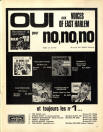
Source: Fulvio Fiore
1970 December
No. 47
Les stupefiantes
aventures de Frank Zappa depuis Cucamonga (Californie) jusqu'
au Hilton Cavaliere de Rome (Italia)
By Geoffrey Cannon, pp 74-75, 77
Frank
Zappa "Chunga's Revenge"
By Paul Alessandrini, pp 88, 90
[1] Automatic translation:
"The most absurd thing that has ever happened to me?" Frank
Zappa said. "Oh, sure when I was arrested for conspiracy to
spread pornography, lust and lustful attitudes." Didn't you
know that? With his eye lit by the enormity of the memory, he
tells the story, which is a parable that does a good job of
explaining the music he has made with the Mothers for the past
five years. (read
more)
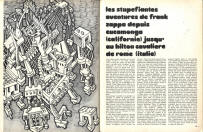
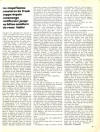

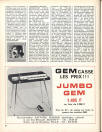
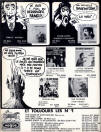
Source: Fulvio Fiore
1971 January
No. 48
Zap is
back
By Paul Alessandrini, p 23
Capitaine Coef de Boeuf
By Paul Alessandrini, pp 35-36
Automatic translation:
It was a comeback, a big comeback in more ways than one. In
this Zappian adventure which is now already sinking into history,
there are two musical stages which emerge, the one which covers
a period started with "Hot Rats", and the one which seems to
have ended with "Weasels ripped my flesh ”. This third Zappian
phase that we were given to discover at the Gaumont Palace seems
to be a synthesis of the two preceding ones ... (read
more)

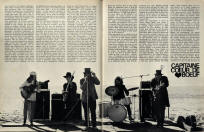
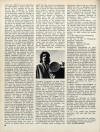

Source: Fulvio Fiore
1971 February
No. 49
L'oeil de
Zappa
By Philippe Paringaux, pp 42-45, 105
Zappa
supériour
By Dominique Chevalier, pp 103-104
Later between 1980-1982 a fanzine named
L'oeil de
Zappa was published by Dominique Chevalier.
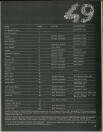


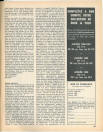

Source: slime.oofytv.set
1971 May
No. 52
Blues
de la canne a sucre (Sugar cane blues)
By Michel Marchon, pp 21, 111
La fin d'un voyage (The end of a journey)
By Paul Alessandrini, pp 46-53
1971 June
No. 53
Le violon selon Jean Luc
(The violin according to Jean Luc)
By Michel Marchon, pp 46-49
1971 October
No. 57
Mothers
Of Invention "Fillmore East - June 1971"
By Paul Alessandrini, pp 81, 83
Automatic translation:
A record that marks the great return to the Mothers of Invention
for Zappa; unlike the previous album which presented itself
more disjointed, a series of songs ("Chunga's revenge"), here
consistency is fully claimed. As suggested by the last Parisian
concert, it is the return to the great era of the theatricalization
of music made of humor, satire, parody vocals. (read
more)

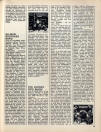
Source: Fulvio Fiore
1971 November
No. 58
200 Motels - Tournee US avec les Mothers
By Philippe Paringaux, pp 52-59, 93-95
Full text available @
www.fredunzel.com →
Traductions → Articles.
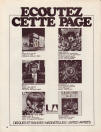
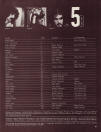
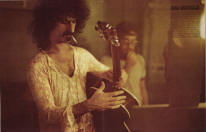


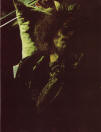
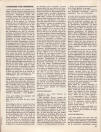
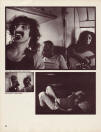

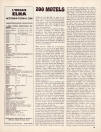

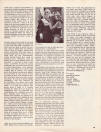
1971 December
No. 59
200 Motels - Tournee US avec les Mothers
(part II)
By Philippe Paringaux, pp 60-67, 108
200 Motels
(review)
By Paul Alessandrini, pp 82-83
Part II of the article, which full text is available
@ www.fredunzel.com →
Traductions → Articles.
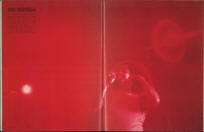
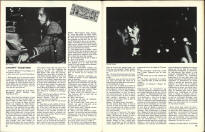
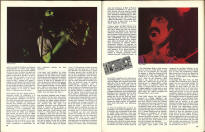


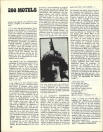
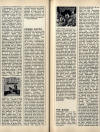
Source: slime.oofytv.set
Automatic translation:
"Oh, a little incident: someone had the crazy idea of shooting
a fireworks rocket at the ceiling, while Don (Preston) was attacking
his 'King Kong' moog solo. I said “Fire, Ladies and Gentlemen,
by Arthur Brown. They thought it was a joke, but a few minutes
later there was no more ceiling and soon no more Casino de Montreux
... (read
more)
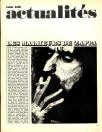

Source: Fulvio Fiore
Automatic translation:
A new Mothers album recorded in public, the skilful, professional
exploitation of a repertoire and an orchestral formula. What
was the subversive, provocative creation ("Freak Out", "Absolutery
Free") of the Zappa of the first era, what was the instrumental
experimentation ("Uncle Meat") gave way to a perfectly put together
show that relegates music to the background to make way for
the theatricalization essentially assumed by the voices of Howard
Kaylan and Mark Volman. (read
more)
![]()
![]()
In this issue are also results of the "rock composer of the
year" poll, where Frank Zappa is #1 with 42880 votes.
![]()

Source: Fulvio Fiore
Automatic translation: Frank Zappa
was born in Los Angeles. The Mothers Story Begins in LA This
sprawling city is the blessed setting in which all Zappian tragedies
take place. But that doesn't matter, after all. LA is New York,
San Francisco, and Des Moines; it is also. London, Paris, and
Saint-Nom-la-Bretèche. That is to say the dismal existence of
millions of kids and chicks, divided between an insipid school,
a sad family to throw up and all the schemes of merchants attracted
by these consumers of a new species. (read
more)

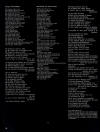

Source: Fulvio Fiore
1972 October
No. 69
Symphonie en rock
mineur
By Philippe Paringaux, pp 70-73
Waka/Jawaka (review)
By Paul Alessandrini, p 82
Mark & Howard Happy Together
By Marjorie Alessandrini, pp 31-32
Automatic translation:
It must be admitted, the favorite interlocutor of rock music
has never been the intellect. This is also what largely constitutes
its strength. The emotion that the genre gives to those who
listen to it as well as to those who play it is generally (and
this "generally" is situated at the extreme border of "always")
divided between raw emotion and a seductive tenderness ( verbal
or instrumental, it doesn't matter) that one could qualify as
poetic. In both cases, communication between artists and their
audiences takes place on an epidermal, sensual level. In all
cases and whatever the detour used, the listener is stirred,
brought to feel a feeling, whatever it is. (read
more)
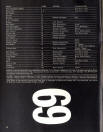

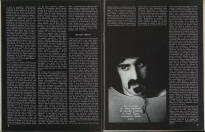
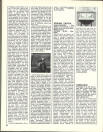

![]()
Source: slime.oofytv.set, Fulvio Fiore
Automatic translation:
Here are two that the nostalgia of the Turtles had to start
to itch. Meanwhile they met Frank Zappa, who lent them his Mothers
to please them. We will therefore find Jim Pons, Aynsley Dunbar
and Don Preston at the control levers. With such musicians,
you can't miss your shot. Obviously, Volman and Howard without
Zappa is a good sauce without a salad to go with it. Lack of
crispiness. Obviously, this was not the goal of the two friends,
who should be happy to find an audience closer to their ambition,
that of teenagers.
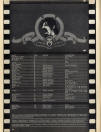

Source: Fulvio Fiore
1974 October
No. 93
Zappa Roma
By Alain Dister, pp 60-67
Billy Bastard (comics)
By Guynard, pp 102-103
Automatic translation:
Instrumentally, the album is a performance. Zappa does the vocals
and all the guitar parts, many of which are worth the trip alone,
but also the bass on most titles, the keyboards and the synthesizer;
Terry Bozzio, the drummer, is the only one to accompany him
through all his outpourings: in this thankless role of drum
blaster, he is effective and powerful, both in the most traditional
rocks and on slow and supported where crawl the perverted figures
of the zappesque universe: the Fellini of rock, grotesque satyr
and grotesque satire. (read
more)


Source: Fulvio Fiore
On page 13 is an excerpt from FZ interview translated
from Sounds, December
18 1976.. The article "Cher batteur" is on Aynsley Dunbar.

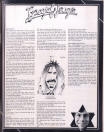

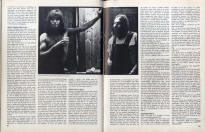
Source: Fulvio Fiore
1977 March
No. 122
Une place au
soleil (A place in the sun)
By Michel Bourre and Patrick Coutin, pp 114-117
Interview with Frank Zappa before concert in
Pavillon de Paris, February 2, 1977.
Automatic translation: “I am another
person. On his black T-shirt, Frank Zappa proclaims his walking
schizophrenia. In the middle of a European tour, he receives
us in the suite of the hotel, rue des Beaux-Arts, which he occupies
for two days. The look, not tired but slightly bored, of someone
who is about to answer the same question for the hundredth time.
The small table is cluttered with glasses of liquor and cups
of coffee. On the floor, an open suitcase lets out a collection
of mysterious cassettes, the universe of an architect of sounds
on the road, the close and immediately accessible environment
of someone who earns his living by manipulating notes and concepts,
and to constantly imagine new ways to organize them and link
them to an overall project. The atmosphere is a bit stuffy,
but thick green curtains protect us from the winter. (read
more)
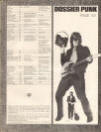








Automatic translation:
Alleged musician, perverse me(ga)lomaniac,
the accused fought for more than ten years to undermine the
foundations of our advanced liberal society, making a mockery
of all the moral values on which the said society is based
... (read
more)







Automatic translation:
Sigmund Freud would have loved that: if you quickly say the
title of the first track, "Titties & Beer", you get something
like "Teddy the Bear". Hence the equation "Beer and Big Tits"
= "Teddy Bear", or if you prefer, the two favorite pastimes
of the average American man are just a monstrous twist of innocent
child's play. (read
more)
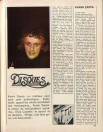

Source: Fulvio Fiore
Automatic translation:
Here is an album which will delight the old fans, those which
were impassioned for “Uncle Meat” and which remained on their
hunger for some time, it must be said well. An album which will
surprise those who discovered FZ with "Apostrophe". (read
more)
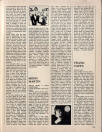

Source: Fulvio Fiore
"The zazous were a subculture in France during
World War II. They were young people expressing their individuality
by wearing big or garish clothing (similar to the zoot suit
fashion in America a few years before) and dancing wildly to
swing jazz and bebop. " (wikipedia)










Automatic translation:
From album to album, Zappa's work takes a noticeable form. Like
the great vintages, it also takes on “body” and an increasingly
subtle “bouquet”. No wonder it becomes almost tedious to find
each new album more interesting than the last. (read
more)
![]()
Source: Fulvio Fiore
1980 June
No. 161
Zappa: cheveux
courts et ides longues
Interview by Francis Vincent & Jean-Marc Bailleux, pp
89-95
Automatic translation:
Frank Zappa wasn't in Paris this time to promote his latest
album, nor to tour, but to present his new film, "Baby Snakes."
A film about people who do things that aren't normal. In its
nearly three-hour full version (which should be reduced here
to about two hours), "Baby Snakes" features Zappa, of course,
but also a good number of the Mothers, from Terry Bozzio to
Warren Cucurullo, from veteran Roy Estrada to the little Diva
Zappa. (read more)
English translation by A.Murkin:
Part One and
Part Two.
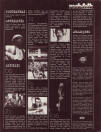

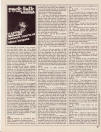


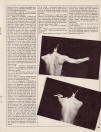

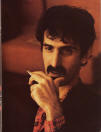
Automatic translation:
For once, he's traveling solo. Frankie Megalo seamlessly adds
six sides to his vinyl legend, and among his thousand and one
talents, chooses to showcase the least recognized: that of guitar
hero. (read more)
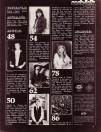
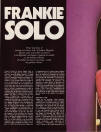
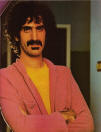
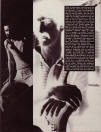
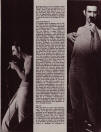


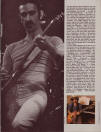
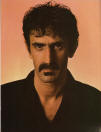
French transition of the article by Dan Ouellette,
originally printed in Pulse,
August 1993.
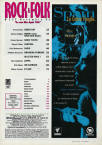
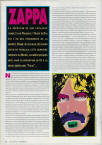
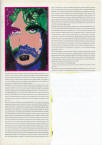


1995 December
Hors-série No. 11 : 300 Disques incotournables 1965 1995
Frank Zappa
and The Mothers Of Invention "Freak Out!"
By Alain Dister, 1p
Frank
Zappa "Hot Rats"
By Alain Dister, 1p
1997 December
Hors-série No. 13 Absolutely Live
Le cas
Zappa
By Philippe Thieyre, 1p
Frank
Zappa - Zappa In New York
By Stan Cuesta, 1p
1999 December
Hors-série No. 15 : Disco 2000 les indispensables
Frank
Zappa & The Mothers Of Invention "Uncle Meat"
By Philippe Thieyre, 1p
Frank
Zappa "Hot Rats"
By Alain Dister, 1p
 Zappa
ou la vérification du principe selon lequel tout rebelle n'est
pas forcément rock. Zappa le trublion goguenard, le contestataire,
lw multi-instrumentaliste virtuose. Zappa l'exemple
parfait d'une approche cérébrale d'une musique qui pourtant
presque par définition part d'un peu plus bas que le crâne.
A la tête de ses Mothers Of Invention, fleuron de l'underground
arty californienne, Zappa fustige avec une ironie féroce l'american
way of life dès "Freak Out!", double album collage (1966),
où le caniche (The Poodle) devient le symbole risible
et dérisoire de la vie domestique. Iconoclaste, il en a autant
au service des hippies ("We're Only In It For The Money" et
sa pochette parodiant "Sgt.Pepper ..."). Mais son éclectisme
musical, son engagement contre la discrimination raciale, n'ont
d'égal que de son despotisme au sein des MOI (question
d'ego?) qu'il vire pour déviance rock'n'roll, lui-même ne dédaignant
pourtant ni les groupies, ni l'herbe. Se satires continuent
d'être mordantes. Elles manquent simplement de venin, laissant
un léger accroc au pantalon comme ceux que font ces petits chiens
agressifs. Roquets ou ... caniches!
Zappa
ou la vérification du principe selon lequel tout rebelle n'est
pas forcément rock. Zappa le trublion goguenard, le contestataire,
lw multi-instrumentaliste virtuose. Zappa l'exemple
parfait d'une approche cérébrale d'une musique qui pourtant
presque par définition part d'un peu plus bas que le crâne.
A la tête de ses Mothers Of Invention, fleuron de l'underground
arty californienne, Zappa fustige avec une ironie féroce l'american
way of life dès "Freak Out!", double album collage (1966),
où le caniche (The Poodle) devient le symbole risible
et dérisoire de la vie domestique. Iconoclaste, il en a autant
au service des hippies ("We're Only In It For The Money" et
sa pochette parodiant "Sgt.Pepper ..."). Mais son éclectisme
musical, son engagement contre la discrimination raciale, n'ont
d'égal que de son despotisme au sein des MOI (question
d'ego?) qu'il vire pour déviance rock'n'roll, lui-même ne dédaignant
pourtant ni les groupies, ni l'herbe. Se satires continuent
d'être mordantes. Elles manquent simplement de venin, laissant
un léger accroc au pantalon comme ceux que font ces petits chiens
agressifs. Roquets ou ... caniches!
Google translation: Zappa or the verification of the principle
that not every rebel is necessarily rock. Zappa the mocking
troublemaker, the dissenter, the virtuoso multi-instrumentalist.
Zappa is the perfect example of a cerebral approach to music
which, however, almost by definition starts from a little lower
than the skull. At the head of his Mothers Of Invention, flagship
of the Californian underground arty, Zappa castigates with ferocious
irony the American way of life from "Freak Out!", Double album
collage (1966), where the poodle (The Poodle) becomes
the laughable and ridiculous symbol of domestic life. Iconoclastic,
he has the same in the service of hippies ("We're Only In It
For The Money" and its cover parodying "Sgt.Pepper ..."). But
his musical eclecticism, his commitment against racial discrimination,
are matched only by his despotism within MOI (question
of ego?) Which he transfers for rock'n'roll deviance, himself
not disdaining yet neither the groupies nor the grass. Satires
continue to be biting. They simply lack venom, leaving a slight
snag in the pants like those these aggressive little dogs do.
Pugs or ... poodles!
Source: Fulvio Fiore
2008 May
Hors-Serie No. 24 : L'impossible Révolution
Les Politiciens du Rock
By Pacôme Thiellement, pp 106-110
Automatic translation:
The Indian of the group, as he liked to introduce himself, James
Inkanish Jr (born February 1, 1938 in El Paso, Texas) is a descendant
of the Cheyenne Indians. He would later adopt his stepfather's
name, Black. He first learned the piano and the trumpet, then
turned to the drums during his time in the US Air Force. (read
more)
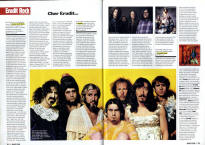
Source: Fulvio Fiore
Automatic translation:
The world is divided into two categories: the freakish geniuses,
who are an excessively small minority, and all the others, who
we qualify as human beings when we are in the mood. Unquestionably,
Frank Zappa was part of the first. (read
more)
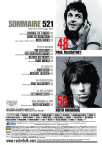
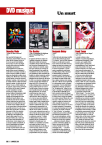
Automatic translation:
["Freak Out!"] This double album is essential to a understanding
of city rock. Got out in 1966 he depicted the Mothers ("us")
at the center of a "cultural desert" called "Hollywood". An
inspired underground theorist, Zappa vampirizes the riffs of
the Stones to make the voices of the freaks heard, many bar
rock fans in town. Kim Fowley (another local cultural luminary)
plays the “Help I’m A Rock” side brilliantly.

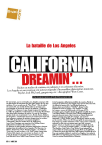
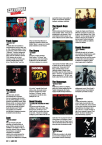
Automatic translation:
Is "identity" "happy" as Alain Juppé claims? Is the burkini
a swimsuit like any other, as stated by Abdallah Zekri, president
of the National Observatory against Islamophobia? We would have
liked, on these questions and the dozens of others, having recently
stirred up France, that Frank Zappa spoke, through songs that
would have been so many middle fingers proudly raised in the
face of the world. Twenty-three years after his disappearance,
his humor and his musical genius are lacking, more than ever,
to mock the flight of our societies into the imagination, this
ocean of signs in which are bathed financial actors, remaining
terrorists, cynical politicians, illiterate visual artists and
psychotic rappers, not to mention all those who have kindly
enriched Nintendo with a few billion by playing Pokemon Go.
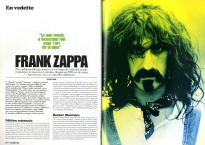
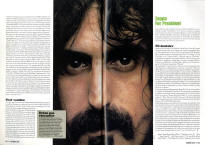
2017 February
No. 594
Frank Zappa: Lumpy Gravy, We're Only
In It For The Money, Cruising With Ruben & The Jets, Weasels
Ripped My Flesh, Joe's Garage
By ?, p 86
This article reviews 3-disc compilation album
L'Avant-Garde 1888-1970, which contains music of Stravinsky,
Varèse, Boulez, Sun Ra, Moondog, Yoko Ono etc. Included also
is a song by Frank Zappa "Dear Jeepers".
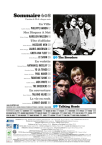

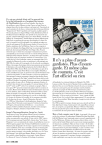
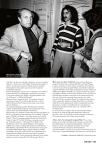
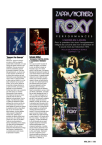
In the article about photographer Jerry Schatzberg
on page 46:
Automatic translation: “He called
me. He had seen the pictures of the Stones for 'Have You Seen
Your Mother...' and he wanted him and all his group is cross-dressed.
He was an amazing guy. In the exhibition I added quotes from
him, he was very funny. When I got finished shooting for his
record cover, I wanted to take my own photos. This shot comes
from there and always sticks me, he represents it well. He is
expressive, intelligent, not aggressive. He talked about the
real things in life and made you think.”

